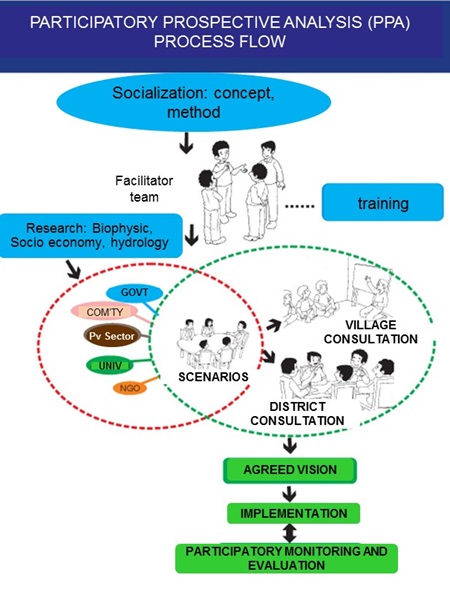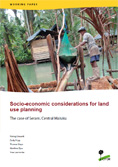
Process
The CoLUPSIA project believes that inequity and conflict can be resolved if governing bodies at the national, regional and local levels are given more detailed data and maps, and if decisions made for these regions are not made in a top-down fashion but rather through collective discussion. The project is currently working on three lines of action as follows.
We are collecting new social and ecological datasets and creating new maps
To date, project staff have created two regency-wide spatial databases. Each has over six map-layers (each made on a 1:50 000 scale) worth of environmental data and will be the premise for a set of land-use recommendations. Integration of social and biophysical data is paramount for the development of LUP decision models. We have also compiled livelihood data from more than 1,500 households in 45 villages in Maluku and Kalimantan. This data covers a socio-economic cross-section of the regional population living in urban and forest edge communities, including traditional forest dwellers and, in some cases, migrants from Java.
In the process of this in-depth data collection, more than 40 people from local NGOs and communities have been trained on various aspects of collective, district-level natural resource management and land-use planning. We are exploring whether CoLUPSIA’s project sites in the Moluccas and West Kalimantan regencies might make viable sites to create a system of potential associated payments or rewards for maintained ecosystem services.
We facilitate participatory stakeholder meetings using a foresight approach
To date, we have held six Participatory Prospective Analysis (PPA) foresight workshops (see Figure 1), which brought together over 50 representatives from different stakeholder groups — including local government officials, regional level academics, NGO workers and the traditional heads of local communities.

Figure 1. The Participatory Prospective Analysis (PPA) foresight method aims to facilitate a more collaborative process for establishing a common vision of the decision makers on a particular subject, which in the case of CoLUPSIA, is the future of land-use, forest and development in our research sites over the next 20 to 30 years.
Through a series of workshops, stakeholders identify variables that may influence the future of their forest, land use and development locally. By analyzing the interaction between these variables, they highlight those that could be used to build different future scenarios, and discuss them in further working sessions. The product is a consensus on specific future scenarios, which can then be presented to the public and decision makers.
If the future scenarios envisioned are deemed negative, participants develop prevention strategies. If the scenario is deemed positive, they work on an action plan to enable it.
Decision makers are often more familiar with approaches that have immediate benefits. The scenario process forces them to consider the long-term costs and adopt forward-looking approaches. Scenario building exercises have also shown how customary law and wisdom strongly influence development processes in Indonesia.
We advocate for a legal framework to implement the collective vision voiced at stakeholder meetings
Forest tenure involves a ‘bundle of rights’ that includes the rights to access, withdraw and manage land and resources, and exclude others from these activities. Full ownership of forest land typically bestows this entire bundle of rights upon the owner. It is also possible for an individual or group to possess limited rights to manage or use forest resources on land they do not own, although these rights are secondary to ownership in terms of legal authority. CoLUPSIA project is helping to develop a legal framework that will facilitate the implementation of the collective vision voiced by stakeholders.
The European Union funded Collaborative Land Use Planning and Sustainable Institutional Arrangements project is run by the the French Agricultural Research Centre for International Development (Centre de coopération internationale en recherche agronomique pour le développement, CIRAD), in partnership with the Center for International Forestry Research (CIFOR), Telapak, Association for Legal Reform based on Communities and Ecology (HuMA), TOMA Lestari (Ambon-based environmental NGO), Riak Bumi (Pontianak-based environmental NGO), the University of Pattimura and the University of Gadjah Mada.
Narrative Reports:








